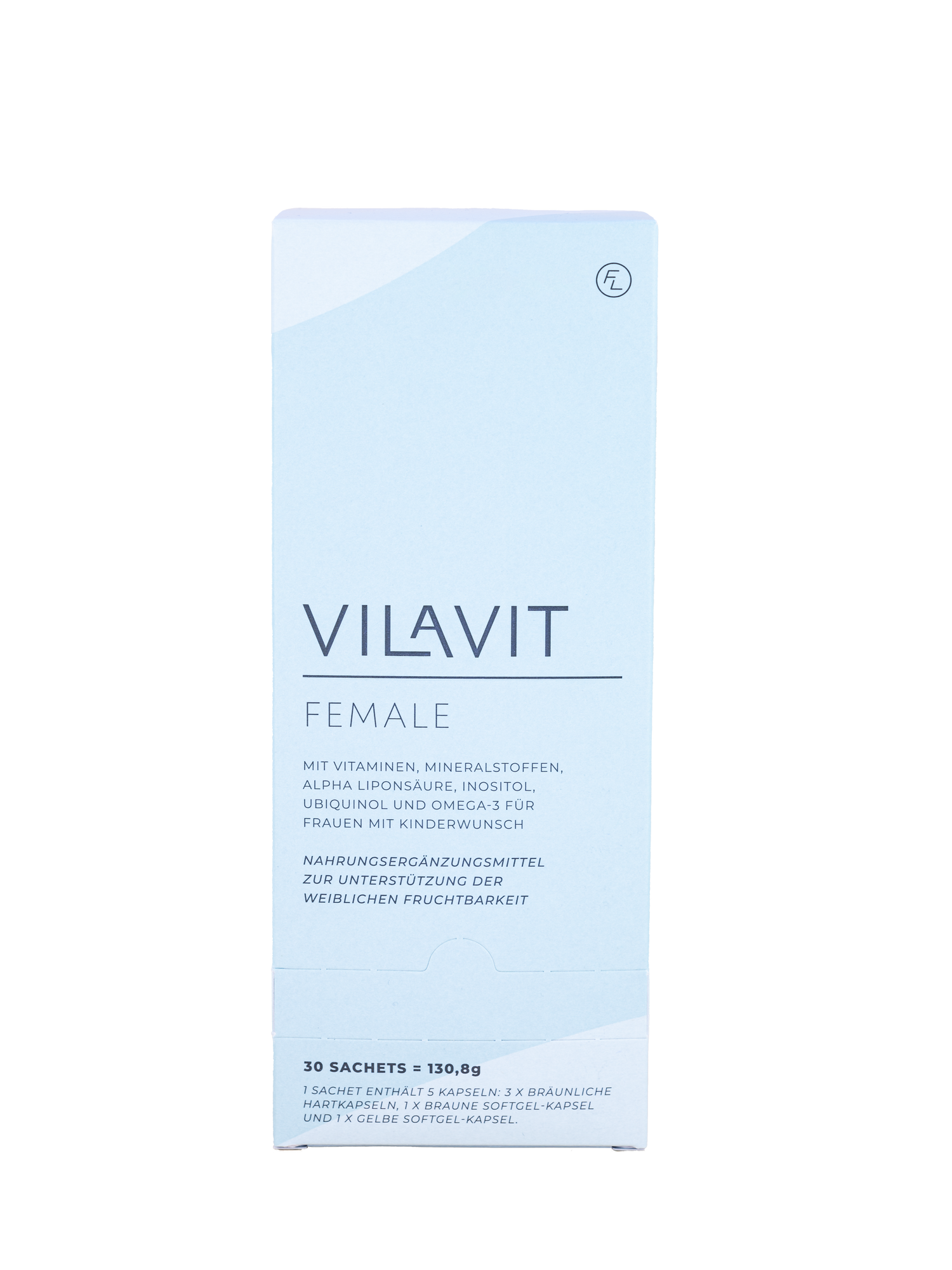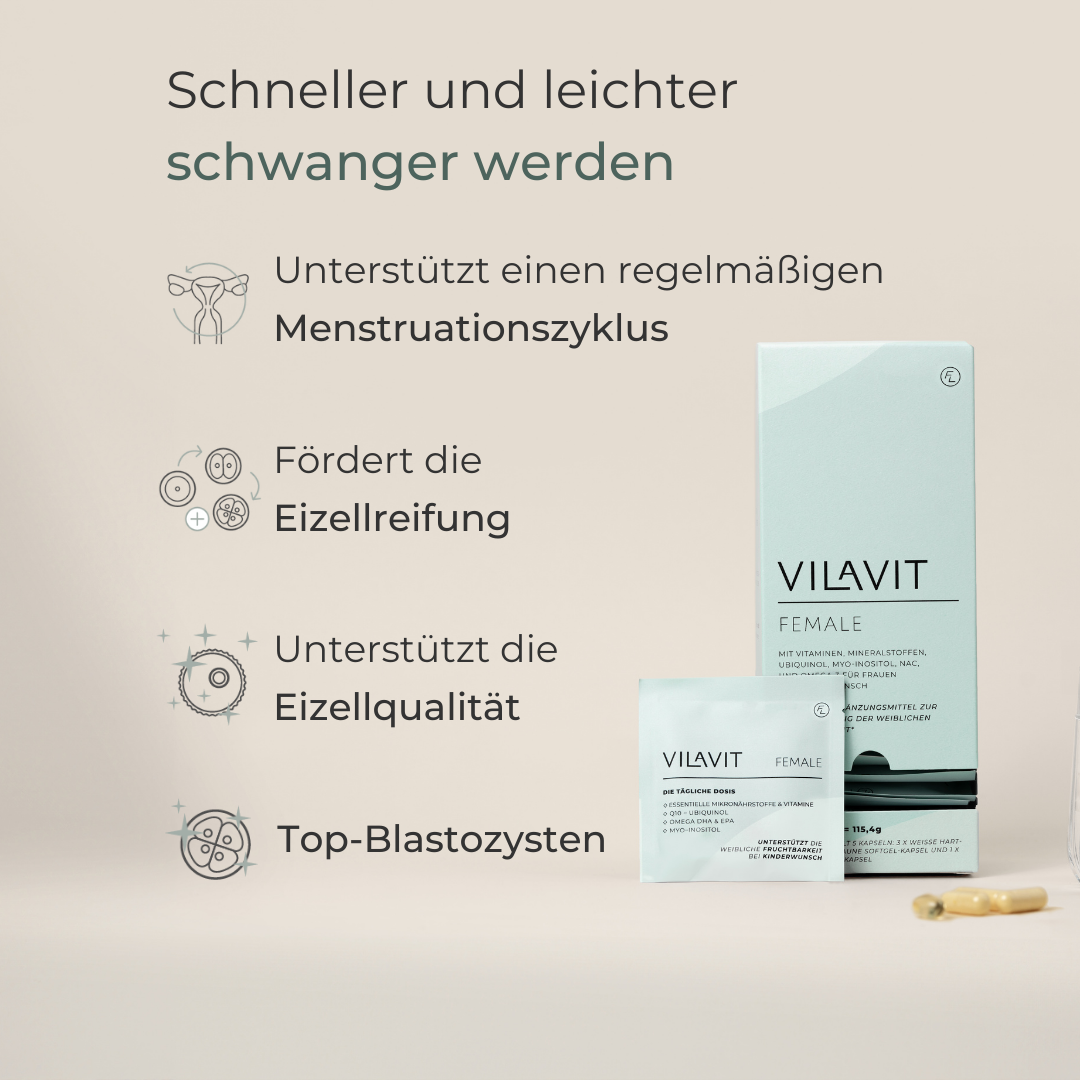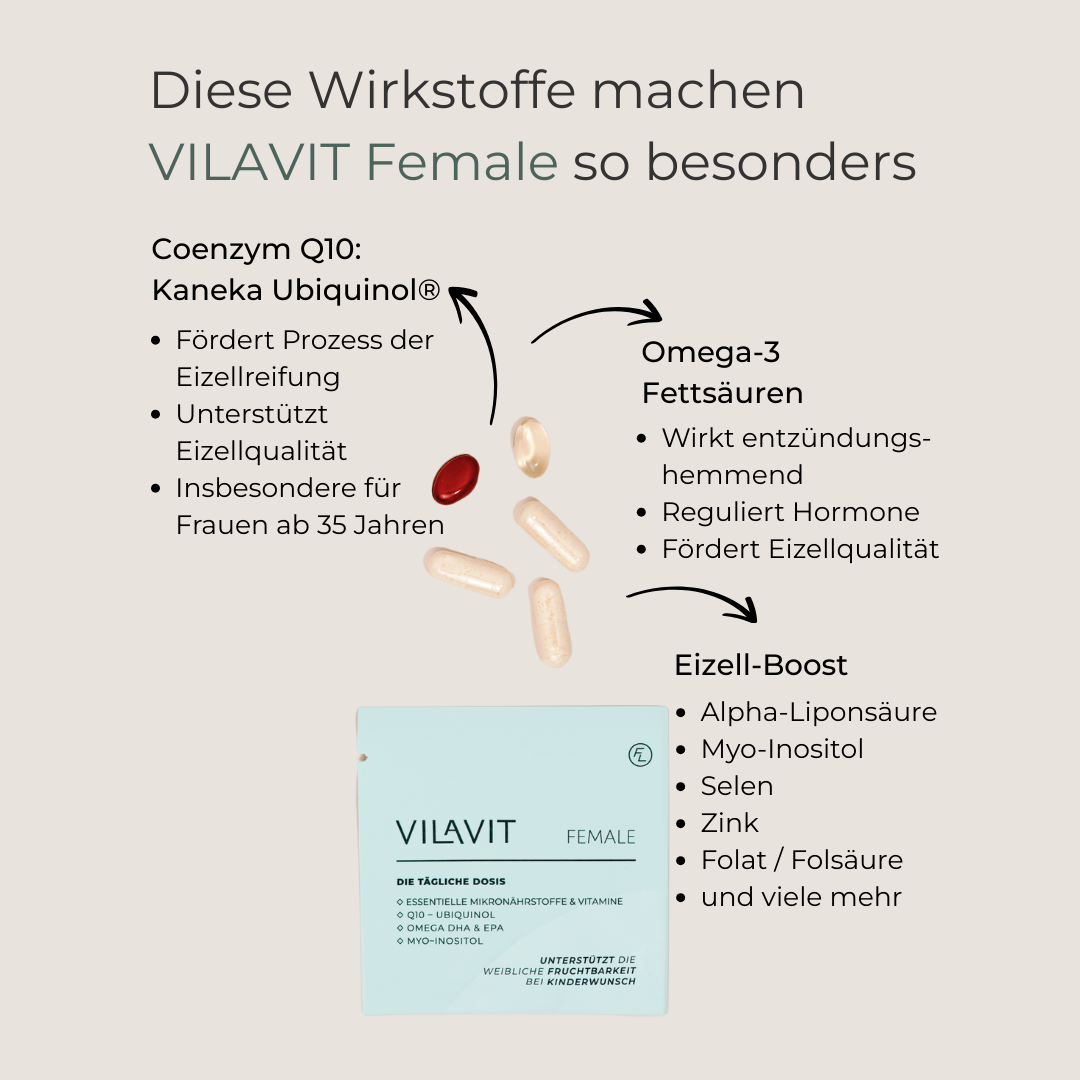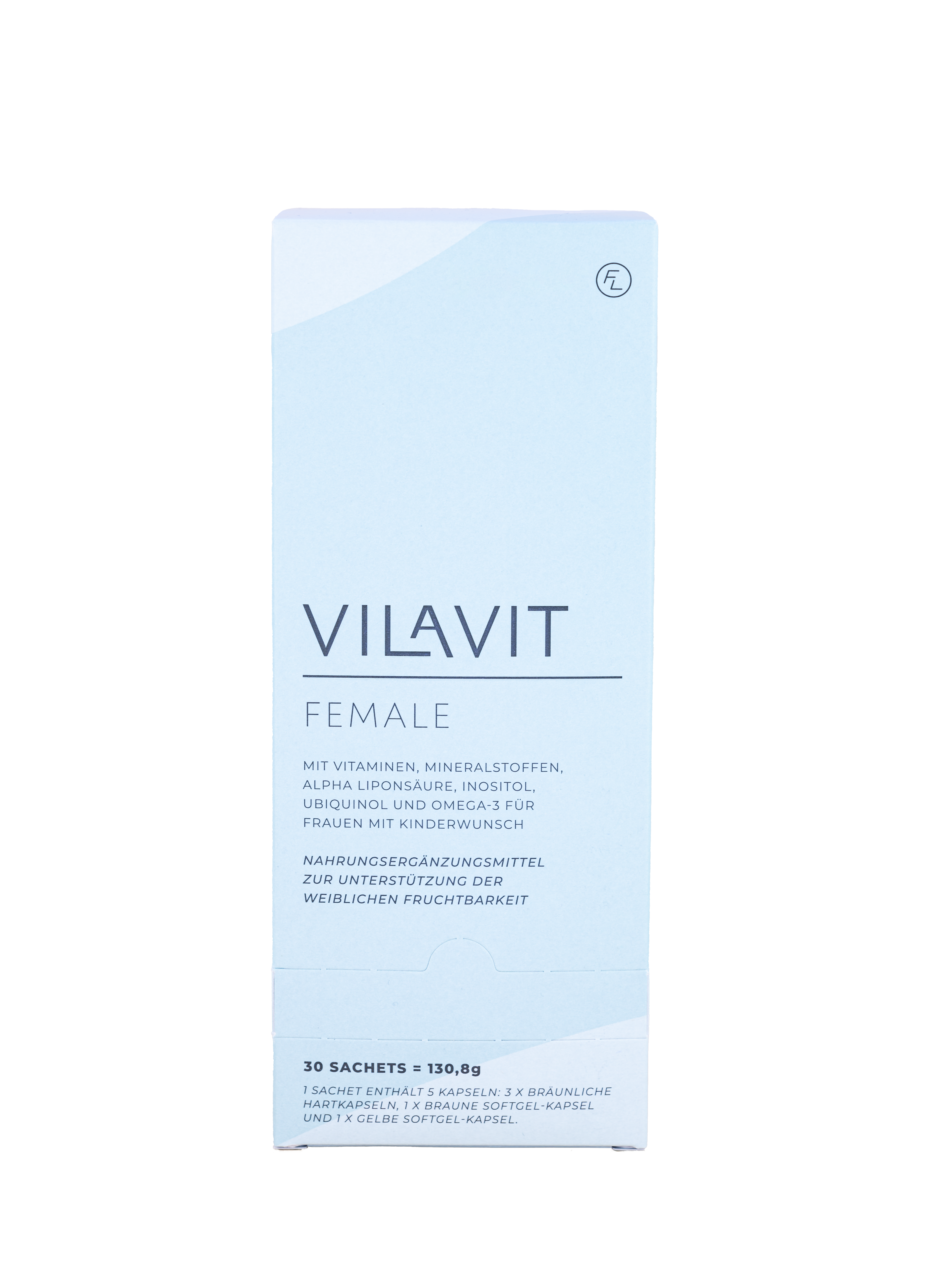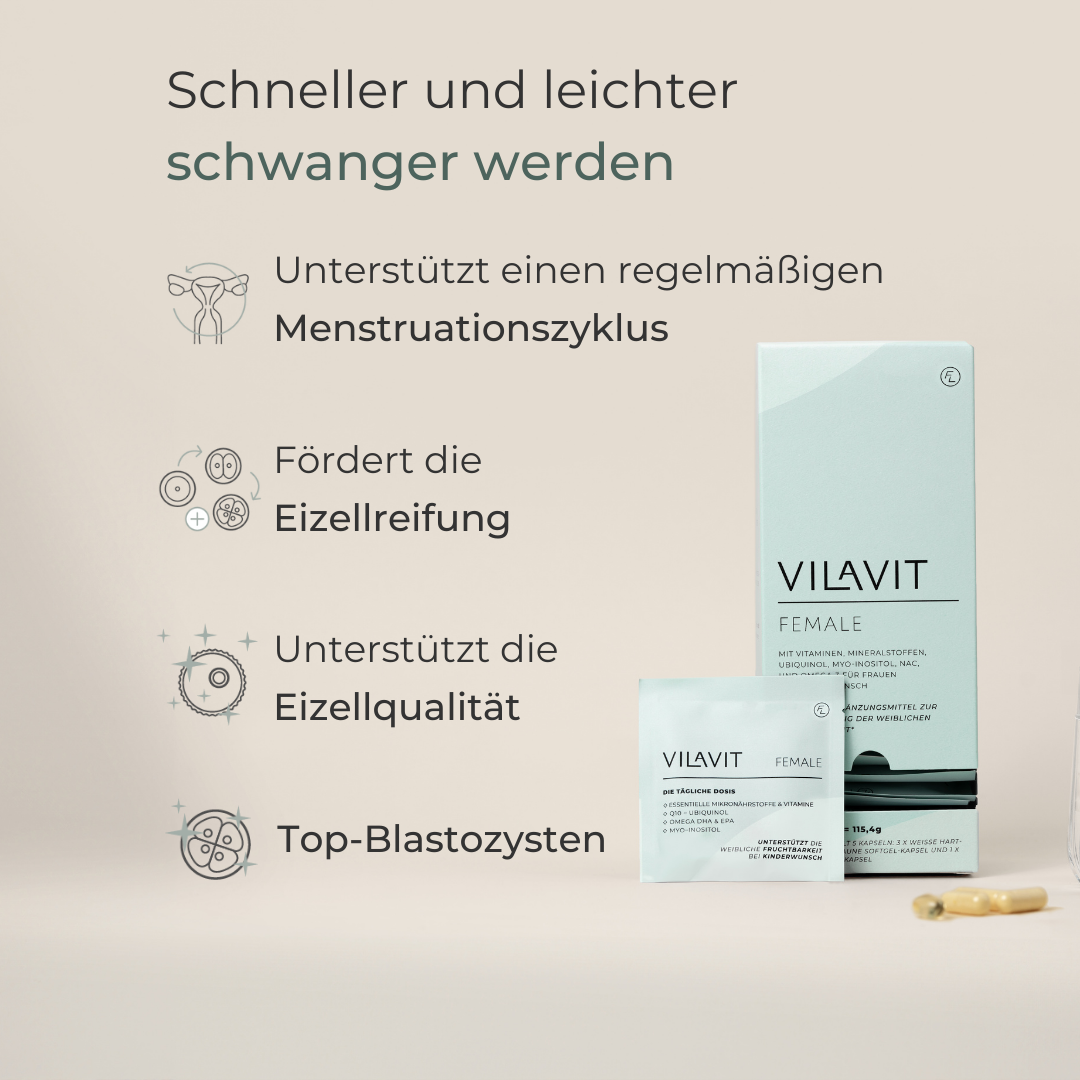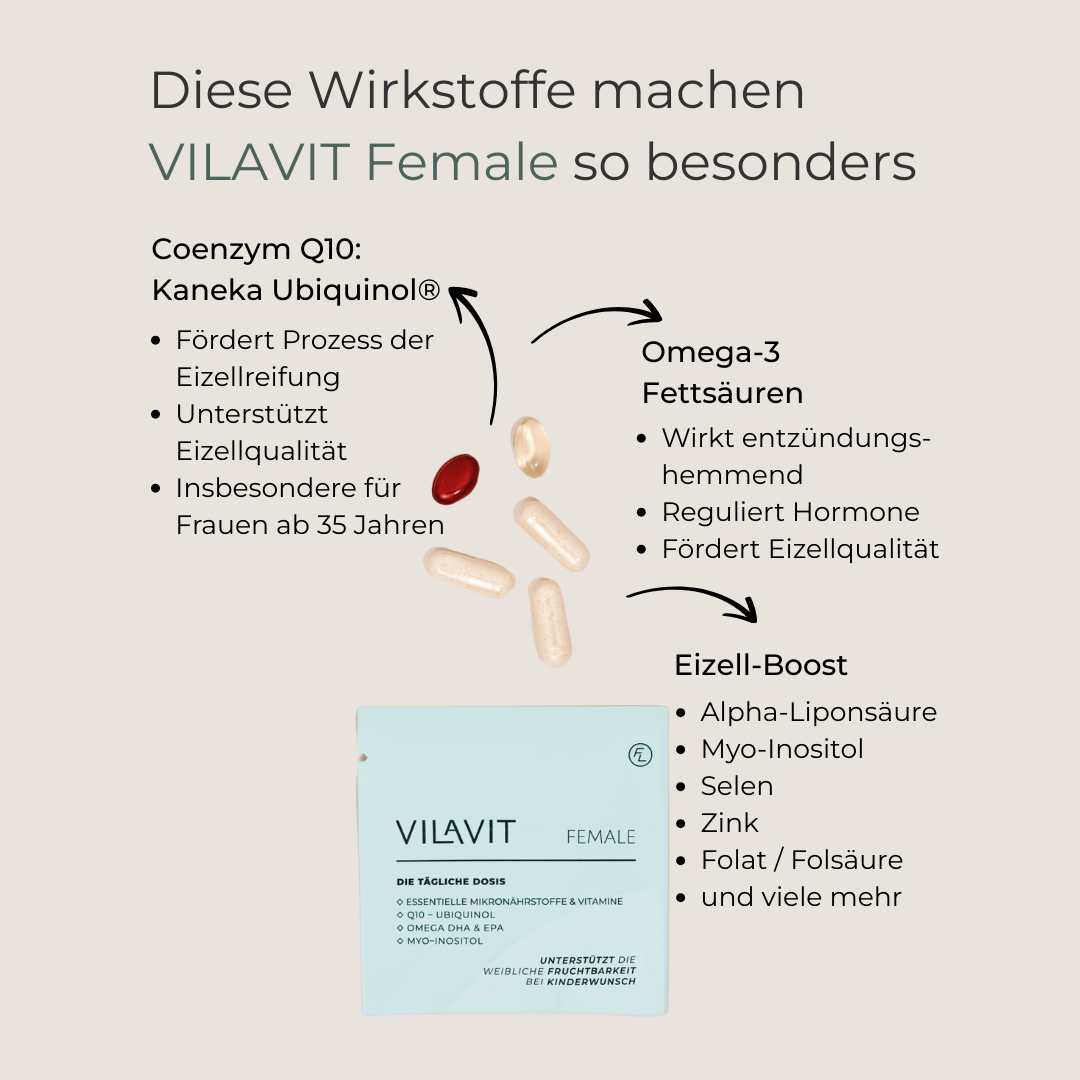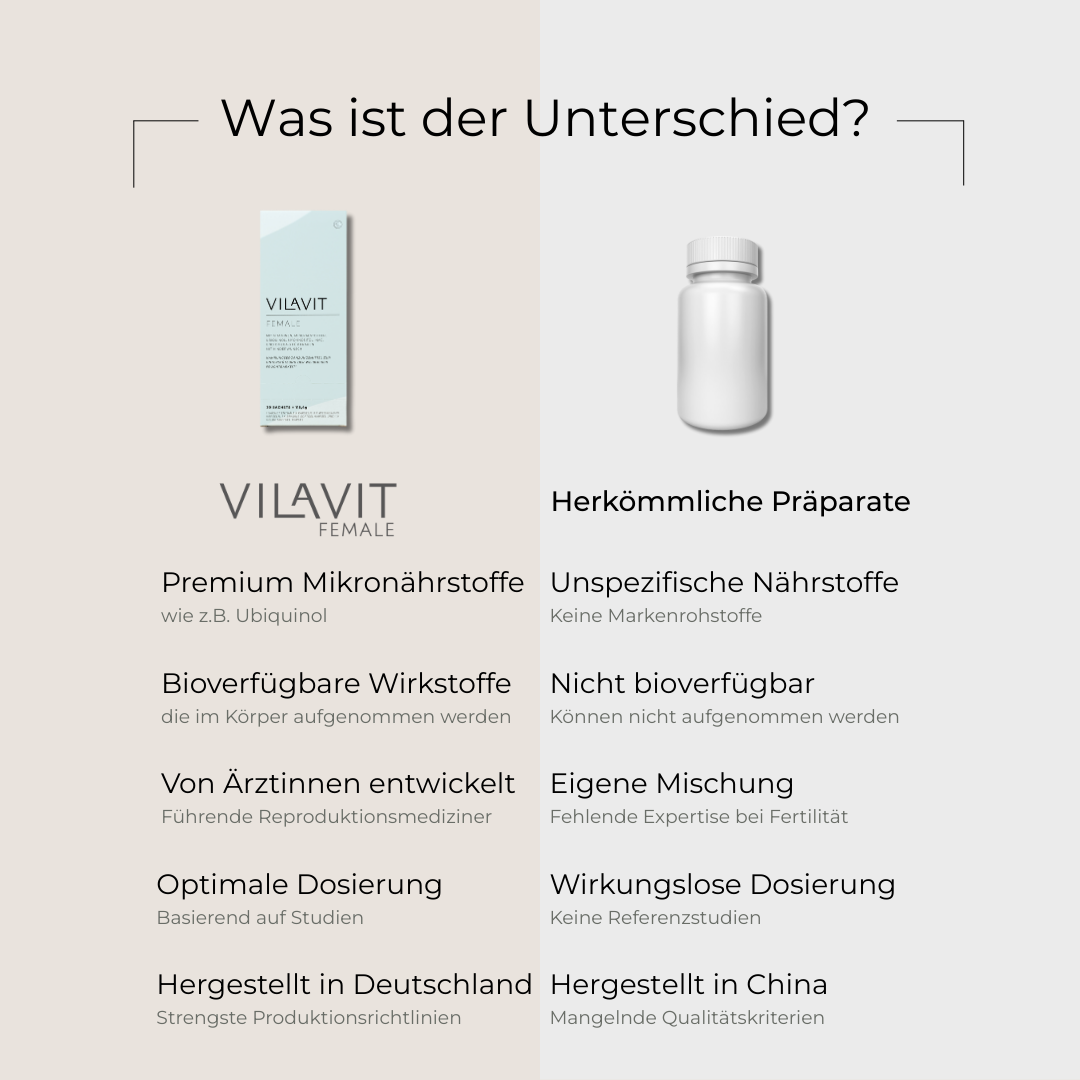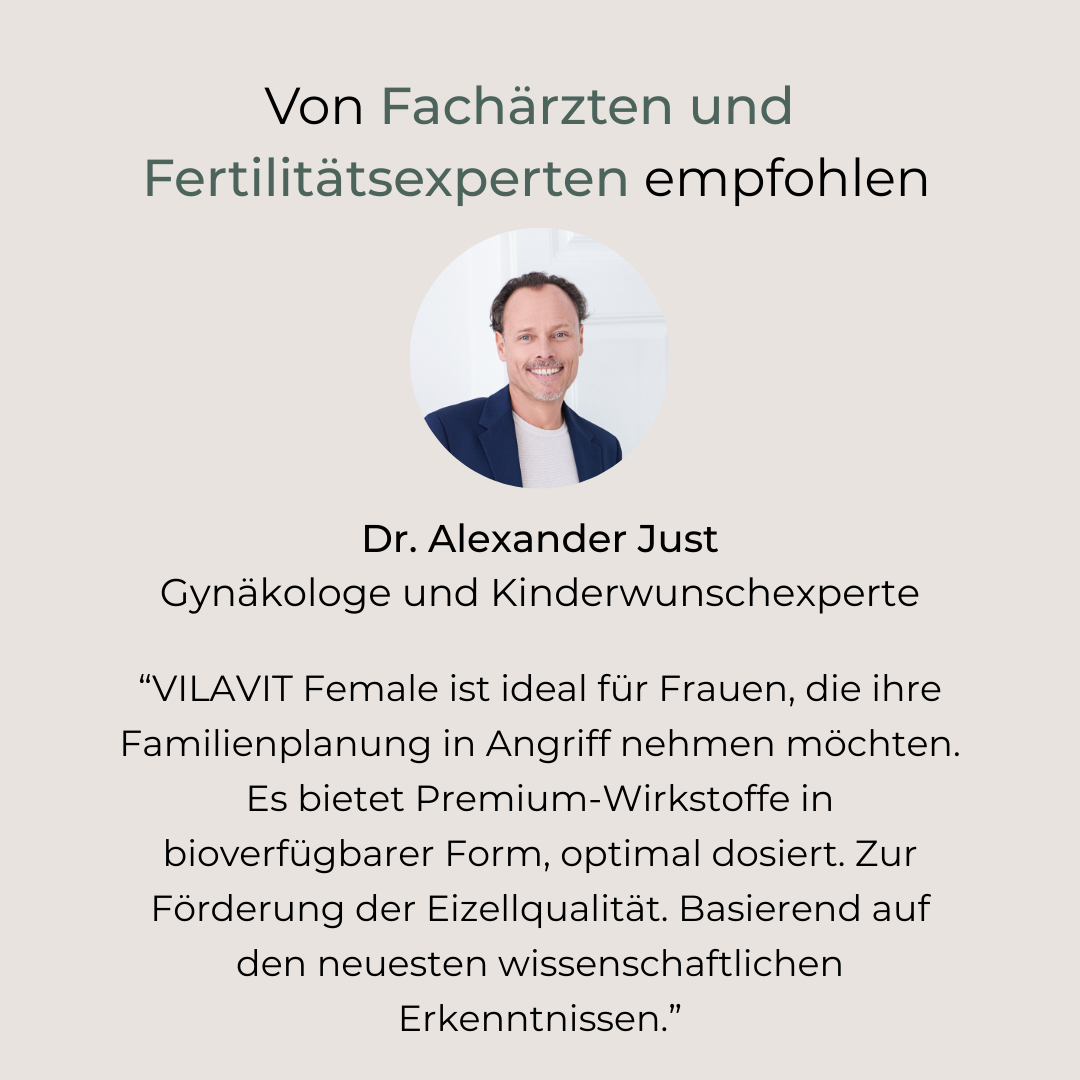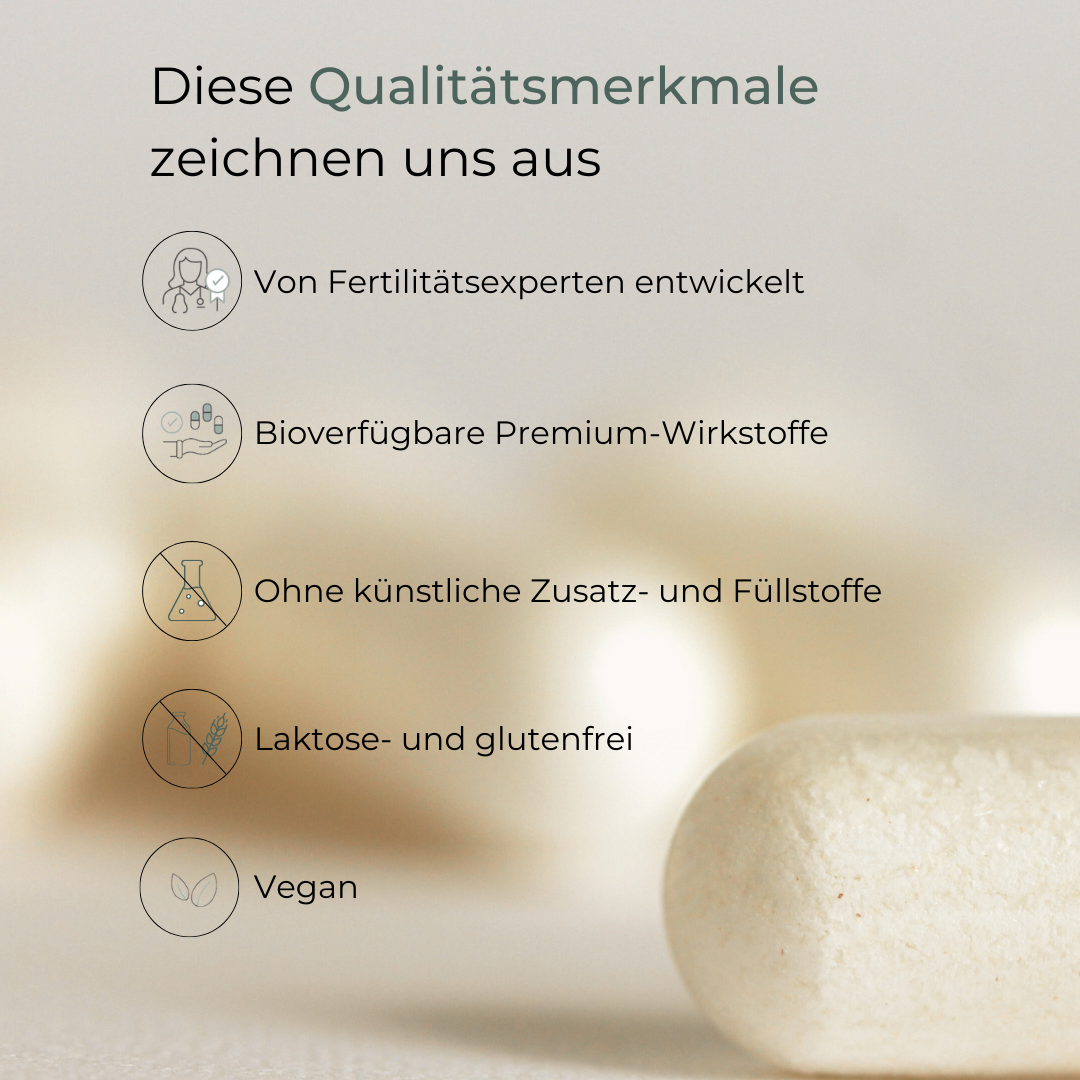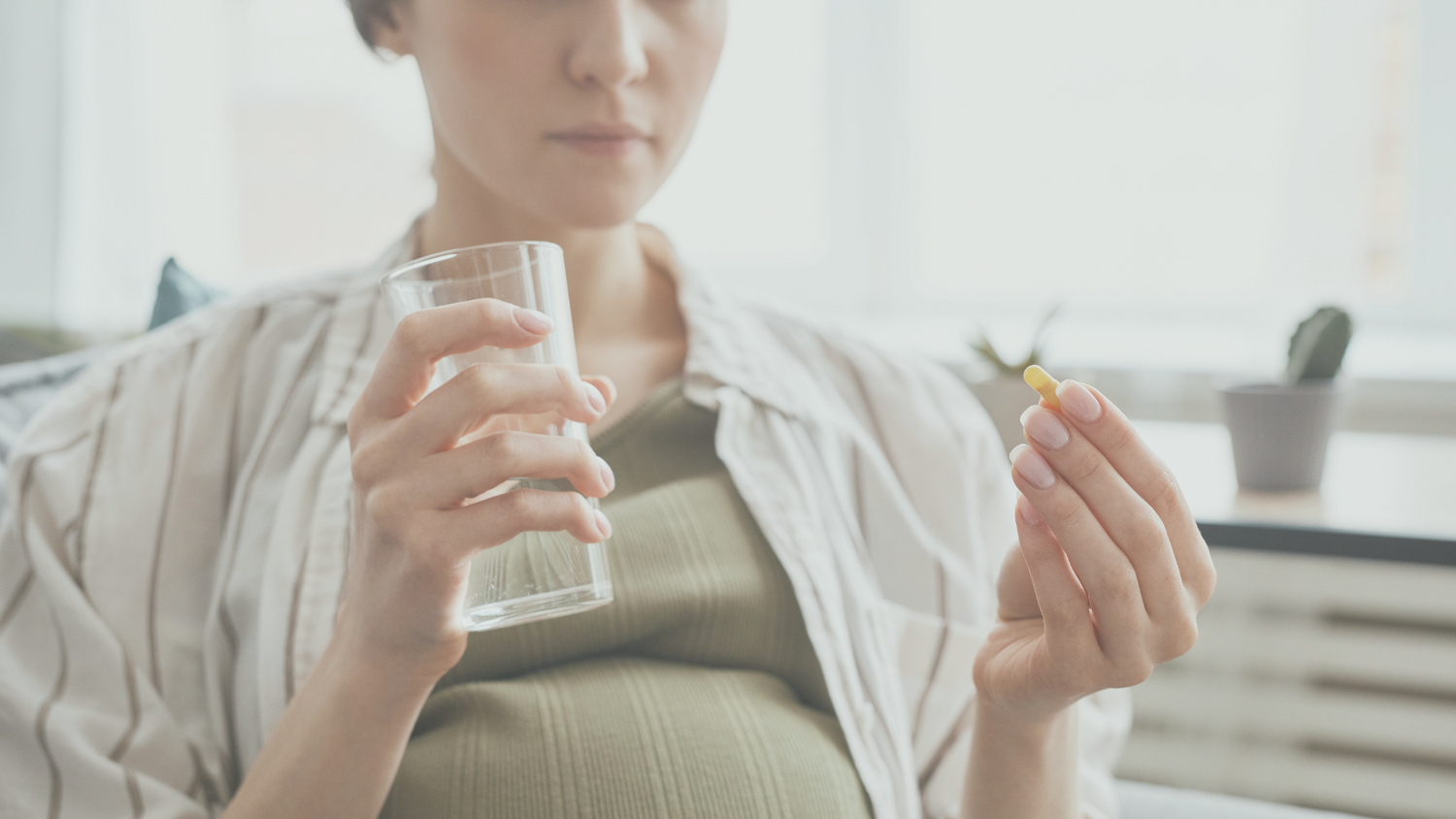The Essentials of Vitamin D and Fertility at a Glance:
-
Vitamin D is a prohormone produced through sunlight exposure and influences numerous bodily processes such as hormone regulation and cell division.
-
In women, vitamin D supports egg maturation, stabilizes the menstrual cycle, and may improve IVF success rates as well as embryo implantation.
-
In men, vitamin D improves sperm quality, particularly motility, morphology, and DNA integrity.
-
A deficiency in vitamin D is common among people with fertility challenges. Targeted supplementation is usually necessary, as around 50 to 70% of individuals are deficient in vitamin D.
-
The recommended daily dose is 800 IU.
Are you dreaming of having a baby and want to optimally support your body on the way to pregnancy? Then you’ve probably come across vitamin D – a vitamin increasingly recognized as a key factor for fertility. Known as the “sunshine vitamin,” it is not only essential for bone health but is also gaining attention in fertility medicine. Studies show: Vitamin D plays a crucial role – for egg quality, sperm production, and the uterine lining. In this article, you’ll learn how exactly vitamin D impacts your fertility, how to meet your needs, and what the science says.
What is Vitamin D, actually?
Vitamin D is technically not a classic vitamin but a prohormone (an inactive precursor of a hormone that is converted into its active form in the body). Your body can produce it on its own through sunlight. When UVB rays hit your skin, it forms vitamin D3 (cholecalciferol), which is then converted in the liver and kidneys into the active hormone form, calcitriol.
This active form acts throughout the body and influences over 1,000 genes involved in cell division, immune function, hormone regulation, and fertility. This is especially important when trying to conceive – both eggs and sperm are sensitive to hormonal and oxidative processes.
How does vitamin D affect egg quality?
Vitamin D plays a vital role in female fertility, particularly regarding egg quality. It acts on several biological levels and supports key processes in egg maturation and health.
Promotion of follicle maturation:
Vitamin D3 is also produced directly in the ovarian follicles, where many vitamin D receptors are found. This shows a close link between vitamin D3 and the growth and maturation of eggs. Studies suggest that vitamin D3 supports the transition of immature (primordial) follicles into developing eggs and promotes follicular growth in later stages (Li et al., 2024).
Regulation of the menstrual cycle through hormonal balance
Vitamin D helps regulate the female hormone system and contributes to cycle stability.
Reduction of elevated androgen levels in PCOS
In women with polycystic ovary syndrome (PCOS), vitamin D reduces elevated androgens, thus creating better conditions for healthy egg development. Studies show a significant correlation between vitamin D deficiency and elevated androgens in women with PCOS. Supplementation led to normalization of hormone levels.
Protection against oxidative stress through antioxidant effects
Vitamin D has antioxidant properties and protects eggs from harmful oxidative stress, which can impair egg quality and fertility.
Improved pregnancy rates in IVF treatments
Studies show that women with sufficient vitamin D levels undergoing IVF treatment tend to have better-quality eggs and improved embryo development. An optimal vitamin D status is associated with higher clinical pregnancy rates during IVF (Meng et al., 2023).
What role does vitamin D play in the uterine lining and embryo implantation?
For a successful pregnancy, not only egg quality matters. The endometrium (uterine lining) must also be optimally prepared so a fertilized egg can implant.
Vitamin D supports key processes in the uterine lining that facilitate implantation. The uterus contains vitamin D receptors (VDR) that bind active vitamin D (calcitriol) and regulate specific genes crucial for implantation. One gene increases endometrial receptivity, while another enhances communication between the uterus and embryo.
One study found that repeated intrauterine administration of vitamin D3 improved the receptivity of the endometrial lining. It also supported a stable connection between mother and embryo during the early implantation phase (Lee et al., 2024).
Vitamin D and its effect on sperm quality
Increased sperm motility
A meta-analysis showed that men with higher vitamin D levels had significantly more motile sperm. In randomized trials, targeted supplementation improved total and progressive motility by about 4–5% compared to placebo (Tania et al., 2023).
Improved sperm morphology
Combined study results indicate that vitamin D deficiency significantly impairs normal sperm morphology (Yan et al., 2023).
Reduction of DNA damage in sperm
Men with unexplained infertility had lower vitamin D levels and more sperm DNA damage. A vitamin D level >20 µg/l significantly reduced the risk of DNA fragmentation (Güngor et al., 2022).
How much vitamin D should you take?
The German Nutrition Society (DGE) recommends a daily intake of 20 micrograms (800 IU) of vitamin D for adults – regardless of age or gender – if no production through sunlight occurs. This amount is considered a maintenance dose for a normal blood vitamin D level.
In the case of a confirmed deficiency (below 20 ng/ml), a higher dose may be temporarily useful – e.g., 1,000 to 4,000 IU per day. You should always discuss exact recommendations individually with your doctor and have your vitamin D levels checked.
Because vitamin D is fat-soluble, take it with a meal that contains some fat, such as yogurt or a drop of oil. You only absorb about 10–20% of your needs through diet; most must come from sunlight or supplements like VILAVIT.
Conclusion: Vitamin D – A small factor with a big impact
Vitamin D is often underestimated when it comes to fertility. It supports egg maturation, sperm motility, and the conditions needed for successful embryo implantation. Especially if you are struggling to conceive or preparing for IVF, it may be helpful to supplement vitamin D – alongside other key micronutrients.
A high-quality fertility supplement like VILAVIT Female can help prepare your body for pregnancy in the best possible way.
FAQs about Vitamin D and Fertility
How can I increase my vitamin D levels naturally?
The main source is sunlight: Your body produces vitamin D in the skin through UVB exposure. Fatty fish (e.g., salmon, mackerel), eggs, and fortified foods also provide small amounts.
How quickly does vitamin D work for fertility?
The effect depends on your initial levels and dosage. It usually takes a few weeks for blood levels to normalize – and effects on the cycle and egg quality are typically seen within 1 to 3 months.
Are there risks associated with too much vitamin D?Yes. Chronic overconsumption can lead to vitamin D toxicity (hypervitaminosis D), which can dangerously raise blood calcium levels. You should not experiment with dosing without medical guidance.
References
Li, M., Hu, S., Sun, J. et al. The role of vitamin D3 in follicle development. J Ovarian Res, (2024). https://doi.org/10.1186/s13048-024-01454-9
Meng X, Zhang J, Wan Q, Huang J, Han T, Qu T, Yu LL. Influence of Vitamin D supplementation on reproductive outcomes of infertile patients: a systematic review and meta-analysis. Reprod Biol Endocrinol. 2023 https://rbej.biomedcentral.com/articles/10.1186/s12958-023-01068-8
Yu-Gyeong Lee, Danbi Lee, Hwijae Cha, Jungho Ahn, Hwa Seon Koo, Sun-Young Hwang, Gaeun Lee, Youn-Jung Kang, The therapeutic effects of vitamin D3 administration on the embryo implantation, Biomedicine & Pharmacotherapy, Volume 176, 2024. https://doi.org/10.1016/j.biopha.2024.116853
Tania C, Tobing ERPL, Tansol C, Prasetiyo PD, Wallad CK, Hariyanto TI. Vitamin D supplementation for improving sperm parameters in infertile men: A systematic review and meta-analysis of randomized clinical trials. Arab J Urol. 2023 https://pmc.ncbi.nlm.nih.gov/articles/PMC10763592/
Yan Teng-Fei, et al., The Association between Serum Vitamin D Levels and Male Fertility: A Systematic Review and Meta-Analysis, Andrologica, 2023 https://doi.org/10.1155/2023/9002938
Güngör K, Güngör ND, Başar MM, Cengiz F, Erşahin SS, Çil K. Relationship between serum vitamin D levels, semen parameters and sperm DNA damage in men with unexplained infertility. Eur Rev Med Pharmacol Sci. 2022 10.26355/eurrev_202201_27875
Maghsoumi-Norouzabad L, Labibzadeh M, Zare Javid A, Ahmad Hosseini S, Abbas Kaydani G, Dastoorpur M. The association of vitamin D, semen parameters, and reproductive hormones with male infertility: A cross-sectional study. Int J Reprod Biomed. 2022 https://pubmed.ncbi.nlm.nih.gov/35822181/




